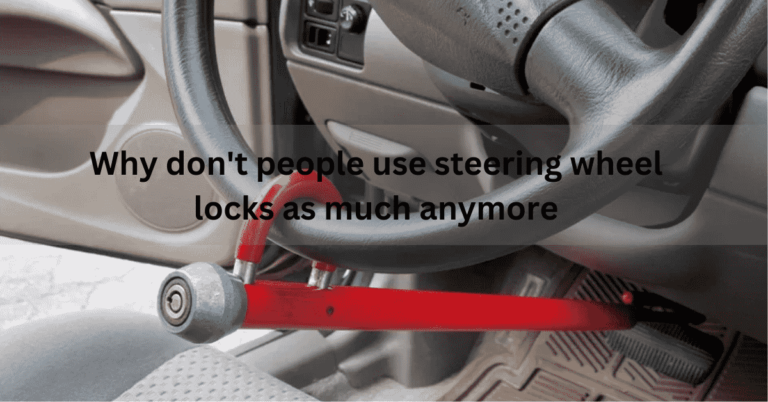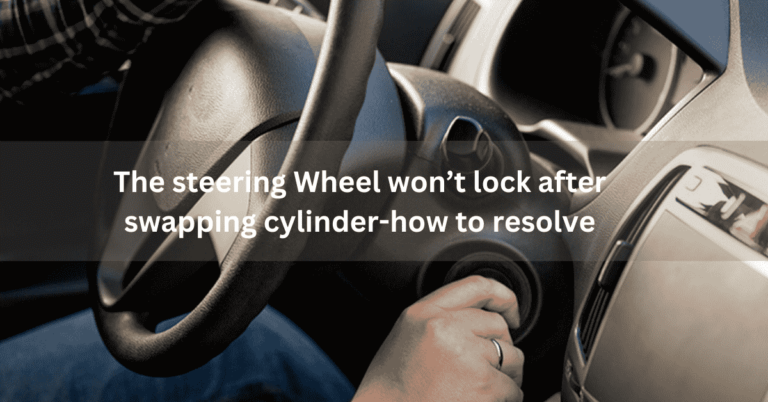5 ways to tackle steering wheel shakes when driving at high speeds
If you are experiencing a steering wheel shakes when driving at high speeds, it is important to understand that this is not a normal thing.
Rather, it could be a sign of an issue with your vehicle’s suspension, steering, brakes, or tires.
When any of these components are worn out, damaged, or improperly aligned, it can cause your steering wheel to shake or vibrate, especially at higher speeds.
Check if the worn-out brake pads or warped rotors can cause the steering wheel to shake.
If the tires are out-of-balance or misaligned it can cause the vehicle to vibrate when driving at high speeds.
It is essential to address this issue as soon as possible with the help of a mechanic. If you continue to ignore these issues it can lead to damage.
It can cause serious risks in driving. If you’re not sure how to diagnose these issues don’t worry. I will give you the proper information to tackle this problem.
Read below:
Check Your Tires
One of the main causes of steering wheel shakes is your tires. There are three things to check in this regard
Tire balance:
An unbalanced tire can cause the steering wheel to shake. That is why it’s important to get your tires balanced regularly.
Tire imbalance can occur due to uneven wear and tear, and damaged suspension components. And even a small weight difference in the tire.
Tire pressure:
Low tire pressure can also cause steering wheel shakes. Therefore, make sure to check your tire pressure regularly.
keep the tire pressure within the recommended range specified in your vehicle’s manual.
Low tire pressure can lead to uneven tire wear, affected fuel efficiency, and even tire failure.
Wear and tear:
Overused or damaged tires can cause vibrations in the steering wheel. Always check the condition of your tires regularly.
Worn-out tires can lead to decreased traction, longer stopping distances, and increased risk of a blowout

Also Read:
Why Don’t People Use Steering Wheel Locks As Much Anymore? Complete Answer In 2024
How Can A Driver Know He Has Turned The Steering Wheel To The Correct Angle?
Check Your Suspension
When it comes to tackling steering wheel shakes. Making sure to check your suspension is an important step.
Here are some tips:
Alignment:
Misaligned wheels can cause steering wheel shakes, so it’s important to get your wheels aligned regularly.
Wheel alignment refers to the angle and direction at which your wheels are set. If your wheels are not properly aligned.
it can cause problems like uneven tire wear, decreased fuel efficiency, and poor handling. Wheel alignment should be checked at least once a year.
Wheel bearings:
Wheel bearings are responsible for allowing the wheels to rotate smoothly on the axle. Over time, they can wear out or become damaged, which can cause steering wheel shakes.
If you hear a grinding noise while driving, it could be a sign of worn-out bearings, and you should have them checked by a professional as soon as possible.
Wheel bearings should be checked regularly as part of your vehicle’s maintenance plan.
Shock absorbers:
Shock absorbers, also known as dampers, are responsible for keeping your vehicle’s tires in contact with the road surface.
They work by absorbing the impact of bumps and other road irregularities. Over time, shock absorbers can wear out or become damaged, which can cause vibrations in the steering wheel.
So always keep in mind to check the shock absorbers as regular maintenance.

Check Your Brakes
When it comes to tackling steering wheel shakes, it’s important to check your brakes as well.
There are three main brake components you should inspect:
Brake pads:
Worn-out brake pads can cause vibrations in the steering wheel when you try the brakes. Check the thickness of your brake pads if any problem occurs. Then replace them if they are too thin.
Worn-out brake pads can also damage your brake rotors, which can further contribute to steering wheel shakes.
Brake rotors:
Worn-out or damaged brake rotors can cause the steering wheel to vibrate, especially when you apply the brakes.
Inspect your brake rotors for any signs of wear or damage, such as cracks or grooves. If you notice any issues, it’s best to replace them instantly.
Brake calipers:
Sticking or damaged brake calipers can also cause steering wheel shakes. When you apply the brakes, the calipers press the brake pads against the rotors to slow down or stop the vehicle.
If the calipers do not work properly, it can lead to uneven wear on the brake pads and rotors. It can cause vibrations in the steering wheel.

Check Your Steering Component:
Regularly inspecting your vehicle’s steering components helps ensure your safety on the road.
Steering knuckle:
One of the most important components to check is the tie rod ends. That connects the steering rack to the steering knuckle.
A damaged or worn-out tie rod end can cause your vehicle to pull to one side or make a clunking noise when turning.
Steering rack:
The steering rack, which converts the rotational movement of the steering wheel into linear movement, is another key component to check. A worn or leaking steering rack can make the steering feel loose or unresponsive.
Power steering pump:
The power steering pump, pressurizes the power steering fluid and helps you turn. the steering wheel more easily moves with the help of a steering pump.
If any signs of leaks or damage can occur it is time to check it properly.
If you notice any issues with your steering or any of these components, it’s important to have them inspected.
Take help from professionals right away to avoid any potential accidents or further damage to your vehicle.
Seek Professional Help
If you notice any issues with your steering or any of the components mentioned earlier in this blog. that can cause a shake in the steering wheel, it’s important to seek the help of a professional.
A qualified mechanic or technician can properly diagnose the issue. And provide you with the necessary repairs or replacements to ensure your vehicle is safe and running smoothly.
Don’t hesitate to take your vehicle in for an inspection if you suspect any issues with your steering or suspension system.

How to diagnose a shaking steering wheel?
If you’re experiencing a shaking steering wheel, it could indicate a few different issues with your vehicle.
One of the most common causes is unbalanced wheels. This can occur due to the buildup of dirt and debris on the rims or tires, or from wear and tear over time.
To check for this, you can take your car to a mechanic or tire shop to have the wheels balanced.
Another possible cause of a shaking steering wheel is worn-out suspension components. The suspension system in your car makes a smooth ride by absorbing bumps and vibrations.
However, over time, parts like the shock absorbers, struts, and bushings can wear out. It can cause the steering wheel to shake.
If you suspect this is the issue, you can check the suspension system for any signs of damage. Such as leaks or worn-out parts.
In any case, it’s important to have the issue diagnosed and fixed as soon as possible. Not only can a shaking steering wheel be uncomfortable to drive.
but it can also be unsafe if left unchecked. So if you’re experiencing this issue, it’s best to take your vehicle to a trusted mechanic to identify and fix the problem.
What to do when your steering wheel shakes?
If your steering wheel is shaking, the first step is to identify the cause of the problem. As I mentioned earlier, this could be due to unbalanced wheels, worn-out suspension components, or issues with the brakes.
If you suspect that the issue is due to unbalanced wheels, you can take your car to a mechanic or tire shop to have the wheels balanced.
This involves adding or removing weights from the wheels to ensure that they’re evenly balanced. This is a relatively quick and easy fix that can usually be done on the spot.
If the problem continues, you can inspect the tires for any damage or uneven wear. If you notice any issues, such as bulges or tears, you may need to replace the tire.
Additionally, you can check the wheel alignment and make sure it’s within the manufacturer’s recommended specifications.
If you think that the issue is due to worn-out suspension components, you can inspect the system for any signs of damage or wear.
This may include leaks, cracks, or worn-out bushings. If you notice any issues, you may need to have the affected parts replaced.
Frequently asked questions:
1. Why is my steering wheel shaking at 70 mph?
If your steering wheel is shaking at 70 mph, it could be due to unbalanced wheels.
And also worn-out suspension components, or issues with the brakes.
It’s important to have the issue diagnosed and fixed as soon as possible to avoid any potential issues.
2. Why does my steering wheel shake when I go over 60 mph?
If your steering wheel is shaking when you go over 60 mph, it could be due to unbalanced wheels.
You can take your car to a trusted mechanic to identify and fix the problem.
3. Can a bad wheel bearing cause vibration at high speeds?
Yes, a bad wheel bearing can cause vibration at high speeds. It’s important to have the issue diagnosed and fixed as soon as possible to avoid any potential safety hazards.
4. At what speed do unbalanced tires shake?
Unbalanced tires can start shaking at speeds as low as 40-45 mph. The shaking will usually get worse as the speed increases.
It’s important to have the wheels balanced as soon as possible to avoid any potential safety hazards.
5. Can a bad tie rod cause shaking?
Yes, a bad tie rod can cause shaking. It’s important to have the issue diagnosed and fixed as soon as possible to avoid any potential safety hazards.
Conclusion:
To ensure your safety on the road, it is crucial to promptly address any possible problems with your vehicle’s suspension and wheels.
If you notice any indications of wear or damage, it is essential to have them carefully examined and repaired.
Moreover, it is advisable to seek help from a reliable and experienced mechanic. This will help you to diagnose and fix any unbalanced tires, or worn-out suspension components.
that may issues compromise your vehicle’s performance and safety. By taking these measures, you can enjoy a smooth and secure driving experience, free of any unexpected problems.
Happy driving







